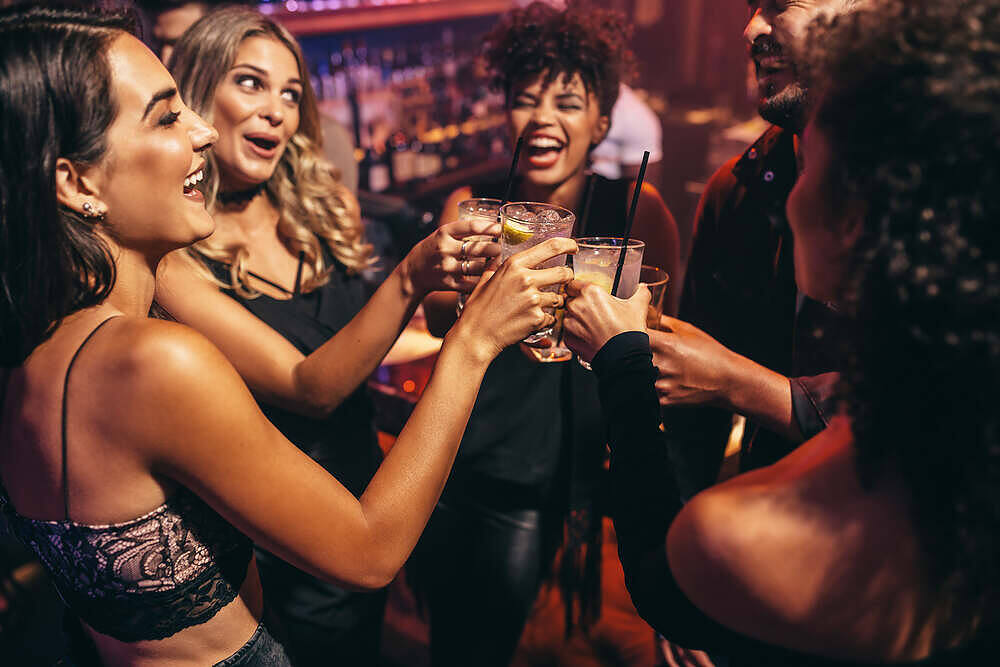
Why do People Drink Alcohol
Why Do People Drink Alcohol? For all sorts of reasons. Some enjoy the taste of alcohol and celebrate with a glass of their favourite tipple.
Others use alcohol to feel more comfortable in social situations or to swallow difficult emotions.

Environment
Exposure to specific environments can lead to regular drinking or consuming alcohol when you don’t plan on it.
Living with someone encouraging you to drink with them every night is a typical example of why some drink frequently. Although you don’t have to drink with who you live with, sometimes it can be challenging to say no.
It’s not news that working abroad or at university in a ‘hard-drinking hotspot’ can lead people to drink more than usual.
If you find yourself in an environment that encourages you to drink more frequently, there are a few ways to approach this if you are unhappy about your alcohol use.
- Reconsider your living or work situations.
- Communicate your desire to cut down on drinking with those around you.
- Take up activities that keep you busy when you usually drink alcohol.
Fun times
Typically, individuals tend to consume alcohol for enjoyment.
The state of being intoxicated brings about feelings of joy and liveliness, and engaging in alcohol consumption with companions can be an enjoyable occasion.
For those who experience apprehension in social settings, drinking aids relaxation and heightens the enjoyment.
People indulge in alcohol consumption at gatherings, nightclubs, cookouts, and various other occasions, as they believe it amplifies their overall experience.
Social norms
Social conventions refer to the anticipated conduct in a society.
For instance, alcohol consumption is customary on certain occasions. It is generally assumed that parties and weddings would include the provision of alcoholic beverages.
Jokes between friends or internet memes where excessive drinking is ‘normal’ or ‘funny’ can promote a harmful drinking culture.
Additionally, exposure to positive portrayals of alcohol use via TV and movies such as ‘The Hangover,’ a comedy film based around the heart-warming friendships formed after the group suffered drug and drink-induced amnesia.
Positive portrayals of harmful drinking cultures are associated with binge drinking at a younger age and higher consumption of alcohol both in adolescence and later in life.
Dopamine hits
Dopamine, a chemical messenger that regulates pleasure and reward in the brain, is crucial in driving behaviour and is linked to various types of dependence.
Ethanol, similar to other addictive substances, stimulates the release of dopamine. Consequently, this can lead to an increased desire for additional drinks, explaining why one may crave a second or even third alcoholic beverage after consuming the initial one.
Stress
Many people reach for the bottle after a stressful day to ‘wind down‘.
Alcohol consumption promotes a surge of positive neurochemicals such as dopamine, GABA, and different endorphins. This mixture of chemicals enhances one’s mood and induces a state of calmness, initially at least.
Alcohol use may seem like a quick fix, but it can have the opposite effect. Alcohol affects the chemicals in your brain, depressing your central nervous system.
As time goes by, the effects of alcohol become less potent with increased usage. Consequently, individuals who consume alcohol regularly do not experience the same euphoria and often consume larger quantities to regain it.
If the brain is consistently subjected to alcohol, it adjusts its chemistry to cope with the effects of alcohol. For instance, as alcohol boosts dopamine and GABA levels, the brain will decrease the production of these substances to compensate for the presence of alcohol. As a result, when alcohol is absent from the body, an individual will experience reduced levels of these crucial neurochemicals. Furthermore, if alcohol consumption is wholly ceased, the feelings of anxiety and depression after drinking can persist significantly until the brain undergoes repair.
Family history
If you have a parent or a close relative who struggles with alcohol abuse, you are more susceptible to developing the same issue.
Research has been conducted on children whose parents had alcohol-related issues, revealing that they are roughly four times more prone to experiencing difficulties with alcohol compared to individuals without such familial background.
It’s likely a family history of alcoholism may indicate shared or common environmental factors, genetic influences, or a combination of both. This suggests that a family history of alcoholism may be a risk factor that could be modified to prevent a person’s alcohol use.
Insomnia
Some say, “Well, alcohol helps me sleep.” Maybe it can help us fall asleep, but it dramatically impairs the quality of our sleep.
According to Dr Matthew Walker, a neuroscientist renowned for advocating quality sleep, insists alcohol and sleep are not a good mix. As a guest on Andrew Huberman’s podcast, ‘The Science and Practice of Perfecting Your Sleep”, Dr Walker describes that alcohol, being a sedative, sedates the cortex, making us lose consciousness quicker, which we mistake for falling asleep naturally.
Sleep becomes fragmented due to the activation of our flight or fight response, meaning our sleep quality is poor. Sleep is, therefore, far less continuous because of this.
Walker describes that we may not even be conscious about the waking moments caused by alcohol. As a potent REM blocker, alcohol hinders the self-generating process that REM sleep allows. Critical for cognitive functions such as learning and memory, quality REM sleep is also essential for emotional and mental health, described as ‘Emotional Firstaid’.
PTSD
Armed forces and law enforcement personnel are professionals who undergo training to operate in stressful and potentially distressing circumstances. This raises the likelihood of developing post-traumatic stress disorder (PTSD) and potentially unhealthy coping mechanisms, such as excessive alcohol consumption.
Both institutions have a tradition of alcohol consumption, as alcohol has traditionally been consumed to foster social connections or alleviate stress.
Individuals with ongoing health issues or pain are more prone to alcohol-related difficulties if they have experienced trauma.
According to The Department of Veterans Affairs, gender also plays a crucial role in this matter. Females who have encountered post-traumatic stress disorder (PTSD) at any point in their lives are 2.5 times more inclined to develop alcohol abuse or dependence than females who have never experienced PTSD.
Anxiety
For people experiencing anxiety, alcoholic substances can give temporary relief.
Alcohol acts as a sedative. It hinders functions in your brain and depresses your central nervous system, and initially, it can reduce your inhibitions.
You may experience heightened calmness immediately, but these outcomes fade rapidly. If you’re suffering from anxiety, consuming alcohol might exacerbate the situation.
Acts of rebellion
Another surprising reason people drink alcohol is to aspire to challenge the norms and establish their uniqueness. This tendency is commonly observed in the younger generation, particularly teenagers transitioning to adulthood – the phase of adolescence.
Alcohol can seriously affect developing brains and bodies, so parents must reconsider the following myth; “If I am too strict about alcohol, my child will rebel and drink to excess”. According to NHS Digital (2020), teenagers of parents who give excessive freedom are likelier to binge drink. When parents don’t allow their children (aged 11-15) to drink, 89% choose not to drink.
If you are a parent, read our advice on the five strategies to prevent your child from drinking alcohol.
The sum up
This article may have given you a better understanding of why the people in your life use alcohol. Thinking about why people drink can provide you with insight into how you want your relationship with alcohol to be.
So the next time you have a stressful day or feel obliged to drink when you don’t want to, consider the effect this might have on your health and well-being.

